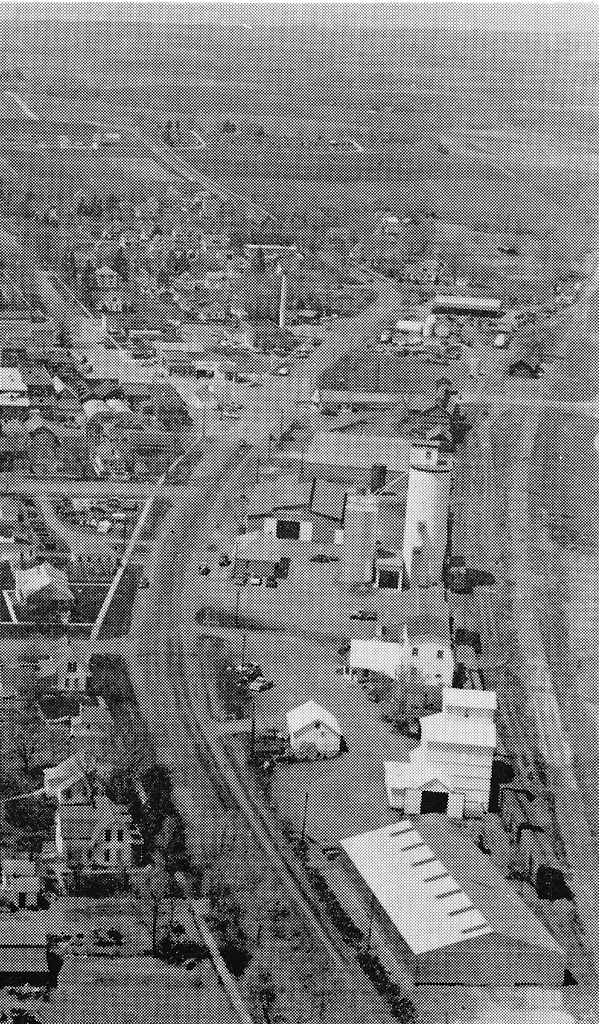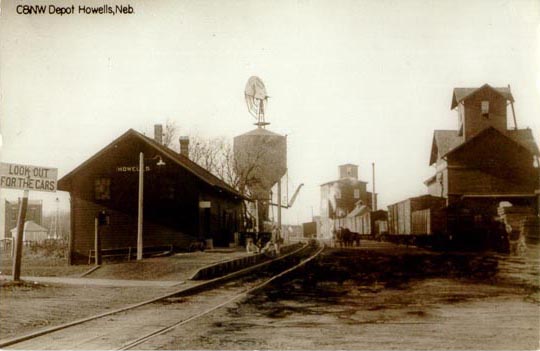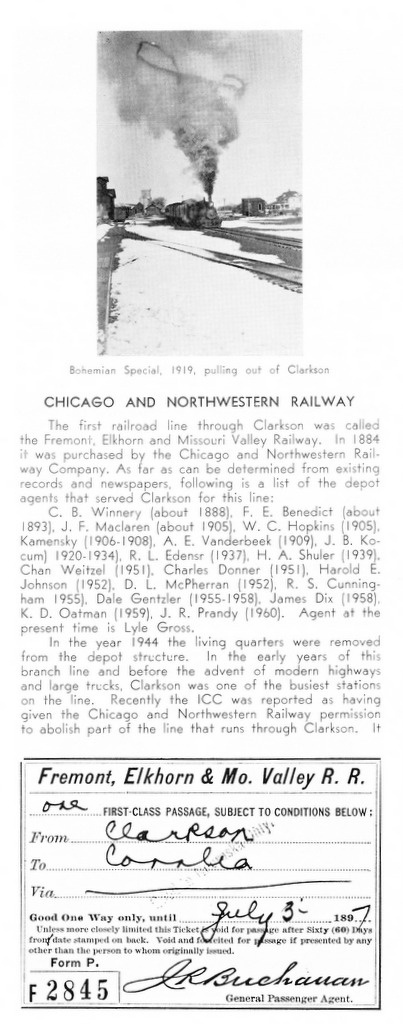This week’s guest posting comes from Dale Gentzler, who lived in Clarkson from 1955-1969 and worked first as a railroad station agent and, beginning in May 1958, as the proprietor of Clarkson Sundries. After leaving Clarkson, Dale wrote a series of stories about his experiences for the Colfax County Press under the byline “The Lump That Didn’t Melt.” His detailed and amusing memories of the quiet village, which he and his wife Eldora came to love, speak volumes about life in our community. With his permission, I plan to reprint parts of them from time to time. In this chapter, Dale tells us about the railroad station:
After about five years as a relief agent with the Chicago and Northwestern Railroad, I finally got my first real full-time job as a depot agent, and we were thrilled. According to the rules, seniority with the railroad plays a large part in where one gets to work. At first, one works wherever openings are available, depot agents’ vacations, and temporary vacancies. As station agents vacate their jobs, their positions are put up for bids; that is, you put your name in and the top guy in seniority who applies gets it.
After years of working a week here, two weeks there, sometimes nights, sometimes days, I finally got a real job, at Clarkson. It was the spring of 1955. I think I replaced a man named Weitzel, whom I had never met.
“Clarkson? You mean Clarkson, where everybody is Bohemian?” people would say. (I found that to be untrue. We were not the only non-Bohemians in town— there was the barber, Bo O’Brien, Dr. O’Neal, and a smattering of teachers at the school from other persuasions.) Besides, there were some Czechoslovakians, some Moravians, some Slovaks, and, well, you get the picture. To people who don’t know any better, any Slav is a “Bohemian.”
I got started off wrong. The first time I drove into Clarkson to start my new job I got my directions mixed up, and they stayed mixed up for the fourteen years we lived there (they still are). That didn’t ease my trepidation. The town seemed almost deserted that day. Then we found out that everybody in town was in Lincoln at the state basketball tournament. I will dwell on that ‘basketball mania’ later.
We found a house right away, a 2-room ‘doll-house’ on the hill on the street just behind Bishop Neumann School. The school wasn’t there yet. No running water in the house— a hydrant just outside the back door. Consequently, that meant no indoor bathroom. No kitchen– just a lean-to porch which we later remodeled into one. A two-room house for three people. Our first daughter, Christi, was a few months old at the time, having been born in Blair in January. I think we moved to Clarkson on Easter Sunday.
The first two persons we met in Clarkson were Frank Richtig, the knife maker, believe it or not, from whom we bought the house for $2000, believe it or not— and Art Fayman, the local hardware and repairman, whom we needed to install something . I sometimes try to remember names by word association, so consequently the next time I saw him, I called him Mr. Eyeman. Good start, Dale.
Well, we were there. Now what?
I stopped in at the depot where the relief agent was sitting, twiddling his thumbs, and I told him I was his replacement. He officially turned over the bookkeeping paraphernalia, showed me whose freight was in the freight-house, handed me the key, and left with,”Well, she’s all yours. Good luck.”
Clarkson Depot – Early 1900s
There I was, all alone where I didn’t know anybody but the knife man and Mr. Eyeman. I walked across the depot platform where I could see west down main street, only it was south, and I thought to myself, “What am I doing here? It might not be the end of the world, but I can sure see it from here.”
I went back into the depot where the telegraph key was rattling away, and suddenly I couldn’t understand a word of it. Dah-dit-dah-dah. In a panic, I looked out the depot window and rolled my eyes to the sky, looking for divine guidance. “OK, God, it’s you and me against the world. What do I do if a train comes in? Get on it?”
My depot experiences weren’t all bad. And, as I look back, some of them were pretty funny- for a dying railroad. Only I didn’t know it was dying at the time. I should have— it wasn’t breathing very well. I needn’t have feared. Things started off okay. I visited many of the business people uptown to get acquainted and was very well received. My job was to try to solicit business for the railroad, although the 50’s were the beginning of the end for less-than-carload shipments, because other means of transportation offered quicker delivery. Carload business was still in existence at that time because trucking was just beginning to get a foothold in the moving of freight. Grain was still shipped by rail, but I didn’t have much to offer in the way of service other than that.
The railroad still had its romantic aura, a holdover from the days of the passenger trains, when everyone in town was interested in who was getting on or off that particular day. The click-clack of the telegraph in the background made a visit to the train depot an interesting one. Railway Express shipments still offered good service, only that, too, was tapering off.
Those days, if I remember correctly, train arrivals on this Albion Line had dwindled to twice a week, once going west and once coming back. Railroad power was still the old steam engines, except for the occasional diesel engine that was just being introduced on the nation’s railways. Every train had an engineer, a conductor, and two brakemen. The track bed on this branch line was in bad shape due to neglect, and there were lots of wash-outs whenever there was a heavy rain.
Some of the first people I met at the depot that first week were, of course, Ed Indra, the local drayman, who met every train to deliver freight to uptown businesses, and the track crew, who came through every day to check and repair tracks. Their names escape me.
Reverend Filinger visited from time to time to welcome us and to invite us to join the Presbyterian Church, but we already had made plans to join St. John’s LutheranChurch in Leigh. We’d have been happy in Clarkson, I’m sure, but we both had been lifetime Lutherans, and Leigh was close. Getting acquainted in Leigh widened our home circle a little bit, too.
Father Kubesh from Sts. Cyril and Methodius Catholic Church was an occasional caller. He nurtured a romance with steam engines, and his hobby was taping train whistles from faraway places. I heard some of them from time to time. One summer day, while the track crewmen were having their noon lunch, lazing their time away on the brick depot platform, with their ‘putt putt’ car sitting near them on the main track, Father Kubesh, inside the depot, plugged in his tape recorder and let loose with one of his loudest whistle tapes. This set the crewmen flying to get their track car off onto the siding. Can’t you just visualize Father inside the depot, with his ever-present cigar in mouth, and having a big belly laugh?
Another event happened while I was depot agent that I will never forget. One day when the train came in, Railway Express dropped off a little burro that had eaten off all its shipping tag except the word “gomery Wa” and “Clarkson.” Here I sat with a real live burro that was supposed to go to I-know-not-who, and what was I to do? I finally learned from Montgomery Ward that a Joe W. Kucera from Clarkson had ordered a burro, and Joe W. confirmed that fact when I called him. He came and got it; then, on the next train through was another burro addressed to “Joe W. Kucera.” We never did find out who really had ordered the first one, but Joe W. felt sorry for the little critter and took him off my hands, paying for both of them. Last I knew they still had ’em both.
One day, expecting the train to come in momentarily, I was visiting with Ed Indra, who was also waiting there on the dock in his dray truck. Another man, named Joe Indra, came hobbling past us and walked along the tracks on out of town to his farm just west of town. Neither Ed nor Joe had acknowledged each other, and it occurred to me, “Hmmm, Ed Indra, Joe Indra– I wonder if they are related.” So I asked Ed that question. He hesitated a while then said, “He’s my brother. We haven’t spoken to each other for twenty years.” When I asked why, he said “I can’t remember.” Human nature is a funny thing, isn’t it?
The old depot once had living quarters in it but had long ago been removed. There was no water in this building either, so the outhouse out back was the only ‘facility.’ Two light bulbs hung in the office, and one in the freight house, and that was the extent of the electricity. Telegrams and train messages were sent by Morse Code. I never got very proficient at that in the short time I was a telegrapher— just well enough to get by.
Howells Depot
My job with the C&NW at Clarkson lasted for three years before we found something else. There was talk about the railroad closing this branch line and by this time, the spring of 1958, we had become so entrenched in Clarkson and its people that we hated to think about leaving. So, when Laverne Bryan, the local pharmacist, opened a drug store in Schuyler, and put the Clarkson Pharmacy up for sale, we bought it from him and went into the retail business as Clarkson Sundries, the same store as before, but without the pharmacy. Clarkson Bank was very cooperative with us in financing the venture, because they didn’t want to see the store close.
It was coincidental that Vern Bryan, the pharmacist, was involved in one of my last, and saddest, memories as a depot agent. He had bred and raised parakeets at his home, and when he decided to move to Schuyler he sold his entire flock of parakeets, two or three hundred of them, to someone back east. He shipped them via Railway Express, from the Clarkson station, and it so happened that, shortly after the train had picked up the shipment of birds, it derailed somewhere east of town, and since it was early spring the weather was still cold and the entire flock died overnight. Vern was reimbursed by Railway Express for his loss, but he was devastated at the deaths of his pets, and I was, too. It was just another example of how the railroad system was deteriorating, and it was frustrating.
The railroad line was abandoned shortly after I left it. The depot stood empty until 1962 when Lloyd Budin purchased it and reopened it as Clarkson Body Shop.
After leaving the railroad business, we continued to live in our little house on the hill for five more years, and got it quite livable, thanks to a lot of help from our parents and other folks. We got running water, made a bathroom out of a closet and remodeled the enclosed back porch into a kitchen. – Dale Gentzler
Comment from Robert Prazak – Living just north of the railroad tracks for my entire youthful years, this story from Dale brought back many good memories. Walking home from school each day meant following the tracks for about a block. My main fascination was seeing how far i could walk while balanced on the track without falling off. As i remember my record for distance was the entire block which i accomplished a few times. One time some of the older boys enticed me to put a penny on the track and watch the train run over it. Sure enough when the train ran over it there was a squashed penny that was about 3 times its original size. The next thing they enticed me to do was to put a grain shovel from the local elevator on the track. We put it on the track but didn’t wait around for the train, but i do remember either you, Dale, or someone from the elevator coming to our house and asking my dad if i had anything to do with it. Evidently they caught it before the train arrived. Never tried that again.









Living just north of the railroad tracks for my entire youthful years, this story from Dale brought back many good memories. Walking home from school each day meant following the tracks for about a block. My main fascination was seeing how far i could walk while balanced on the track without falling off. As i remember my record for distance was the entire block which i accomplished a few times.
One time some of the older boys enticed me to put a penny on the track and watch the train run over it. Sure enough when the train ran over it there was a squashed penny that was about 3 times its original size. The next thing they enticed me to do was to put a grain shovel from the local elevator on the track. We put it on the track but didn’t wait around for the train, but i do remember either you, Dale, or someone from the elevator coming to our house and asking my dad if i had anything to do with it. Evidently they caught it before the train arrived. Never tried that again.